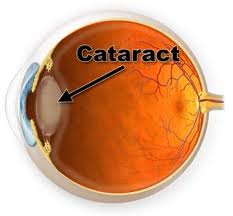A cataract is a clouding of the lens in your eye that affects vision. Most cataracts are related to aging. To understand how a cataract can affect your vision, it helps to understand a little about the structure of your eye.  The lens is clear and lies between the iris and the pupil. It works much like a camera lens, focusing light, or an image, onto the retina. The retina is the light-sensitive tissue at the back of the eye. Once the light or image reaches the retina, it is changed into nerve signals that are sent to the brain. Besides focusing light on the retina the lens also adjusts the eye’s focus, letting us see things clearly both up close and far away. The lens must be clear for the retina to receive a sharp image. The lens is made of mostly water and protein. The protein is arranged in a precise way that allows light to pass through it without distortion. But as we age, proteins in the lens clump together and darken, causing a cataract. If the lens is cloudy from a cataract, the image you see will be blurred and colors may appear faded.
The lens is clear and lies between the iris and the pupil. It works much like a camera lens, focusing light, or an image, onto the retina. The retina is the light-sensitive tissue at the back of the eye. Once the light or image reaches the retina, it is changed into nerve signals that are sent to the brain. Besides focusing light on the retina the lens also adjusts the eye’s focus, letting us see things clearly both up close and far away. The lens must be clear for the retina to receive a sharp image. The lens is made of mostly water and protein. The protein is arranged in a precise way that allows light to pass through it without distortion. But as we age, proteins in the lens clump together and darken, causing a cataract. If the lens is cloudy from a cataract, the image you see will be blurred and colors may appear faded.
How is the cataract removed?
A small incision is made on the side of the cornea, the clear, dome-shaped surface that covers the front of the eye. The surgeon inserts a tiny probe into the eye. This device emits ultrasound waves that soften and break up the lens so that it can be removed by suction. Most cataract surgery today is done by phacoemulsification, also called “small incision cataract surgery.”
After the natural lens has been removed, it often is replaced by an artificial lens, called an intraocular lens (IOL). An IOL is a clear, plastic lens that requires no care and becomes a permanent part of your eye. Light is focused clearly by the IOL into the retina, improving your vision. You will not feel or see the new lens. Depending on your vision and needs, you may be a candidate for a special type of IOL that either corrects astigmatism or acts like a bifocal.
Cataract removal is one of the most common operations performed in the United States. It is also one of the safest and most effective types of surgery. In about 90 percent of case, people who have cataract surgery have better vision afterward.